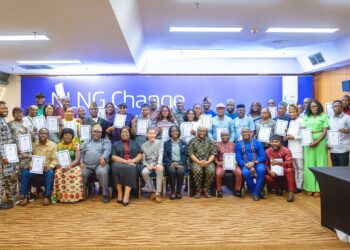By BISI OLADAPO
She may have preferred to hide her fear. But the worrisome look on her face was a clear indication that all was not well with Uju Arinze, the branch manager of a leading insurance company located in Ibadan, Oyo State.
As a marketer, she has a target to meet within the first half of the year. However, with barely two weeks to go, Arinze is yet to meet her target, not even halfway. She started the year with high expectations that the target premium income given to her branch would be achieved by a month before the mid-year date set by her employer. But this has not been possible because of the recapitalization exercise and its fallout.
She found that most of their clients, uncertain of which insurance company will meet the stipulated February 28, 2007 recapitalization deadline were not ready to renew old policies or place new business. Consequently, her premium mid-year income is lean. Her company is not the only one being confronted with this problem. Gbolade Adeniji, marketing officer of a third- generation underwriting firm in Abuja, was told by most of his clients that it was not safe for them to place business with his company when they were not sure if it would recapitalize or not. “Show us the evidence that your company has recapitalized first before we can discuss business with you”, had been the response whenever he went out for business.
When February 28, 2007 finally came and his company was one of those recertified by the National Insurance Commission, NAICOM, the regulatory body of the risk-bearing industry, he heaved a sigh of relief, thinking that business would pick for him. Unfortunately, this has not been so, it now appears that he will have to wait a little longer for the much desired relief.
Exactly two weeks after his company along with 70 other companies received their certificates to operate as fully recapitalized insurance companies, another headache started. The federal government through Nenadi Usman, the former minister of finance, announced that all the 71 recertified companies did not recapitalize, so there would be another round of reverification for the certified companies.
With this development, uncertainty now pervades the industry, a development which Arinze simply describes as “looming danger ahead for the insurance business”.
As for Adeniji, the unhealthy business climate will definitely affect the total premium income of the entire industry as well as that of individual companies’ earned income for this year. “There is no way we can meet our projected premium income for this year as things are now, the industry is not at ease”, he says.
Indeed, the industry is not at ease with the load of problems bearing down on business activities. “If the weight of uncertainty pervading the industry is not heavy enough, what of the load of losses inflicted on our business by the unnecessary holidays we had in the first half of this year coupled with the recent nationwide strike?” asks Sunny Adeda, managing director of Alpha Crown Insurance Brokers.
Last week, insurance operators like other Nigerians returned to their desks to attend to the backlog of work in their offices after the three-day sit-at-home order by the Nigeria Labour Congress, NLC. Like other business operators, they are now counting the losses incurred during the strike. While it is believed that the nation must have lost about N55 billion daily to the strike, Adeda told the magazine that the insurance industry also suffered losses.
“Though the loss to the industry cannot be quantified immediately, insurance business was adversely affected,” he says.
Counting the number of public holidays declared by former president, Olusegun Obasanjo during the April general elections in the twilight of his administration, the annual ceremonial public holidays (that is, Good Friday, Easter Monday, Sallah, Eid-el-fitr and so on) and the strike, no less than 90 man-jour have been lost by the risk-bearing industry alone in the first six months of the year.
“Man-hour loss is a bad wind that blows no one good,” says Adeda. According to him, “salaries must be paid to workers irrespective of man-hours lost. Of course, renewal of policies, investment income and policy purchase will be affected whenever there is man loss in man-hours.
However, insurance operators do not lose much during strike actions, there is solace for them according to Laide Osijo, managing director of Plum Insurance Brokers. She told the magazine last week that whenever there is the likelihood of a strike, insurance brokers usually tell the underwriters to put on hold all pending renewals and covers. “This means that no action should be taken on the insurance covers pending further instructions from the insurers in case the premium for such covers need to be reviewed after the strike”, said Osijo.
Now that the strike has been called off, the risk-bearing industry still has other problems to battle with. The most pertinent issue is the reverification exercise which is yet to commence.
Usman told industry operators that a technical committee would be set up to verify the companies; those that are yet to recapitalize were given up to June ending to do so or be ready to loose their certificates.
At the end of the labor strike, government was yet to set up any committee for the reverification exercise. “What is going on in our industry is not encouraging at all. It speaks volumes to our investors, policy holders and the general public.” Ismaila Mohammadu, a loss adjuster, laments. He bemoans the manner in which the industry is being regulated and controlled, saying that investors may start withdrawing their investment.
“A lot of inventible funds are being held up in the industry now as a result of the lingering recapitalization crisis. This is half year gone, how do you want the operators to deliver good returns to their shareholders at the end of the year when they cannot transact business conveniently? Their funds are still being held up in the escrow account with Central Bank of Nigeria,” he says.
But for Babajide Olayunde-Agbeja, president, Nigerian Council of Registered Insurance Brokers, NCRIB, the commission should not be held responsible for the operators’ predicament. “I am not speaking for NAICOM but I believe that if the challenges they are facing now are not there, the money should have been released,” he asserted even though he agrees that insurance firms, brokers and other related professionals need money for their operations.
Buttressing his views, the NCRIB boss says, “Insurance companies need this money to operate. They went to look for this money to shore up their share capital. In order to raise enough funds to operate, to invest, to employ more competent staff, to buy equipment, and to acquire information technology.” The he quickly adds, ‘but those of us who are blaming NAICOM, is it Hussaini (the acting commissioner for insurance) who knows nothing about the money that will go and release it? Don’t forget that the Zakariya’u panel has been mandated to continue to cross check what NAICOM did. Each company has been asked to wait till the end of June and it stands to reason to wait till end of June”, he concludes.
Corroborating Olayunde-Agbeja’s position, Arinze agrees that government did not cause the problem on ground. For her, “The government is not part of the problem of consolidation, they helped the economy by enforcing consolidation. I think it’s a plus because government cannot sit down and watch things disintegrate, that is what is happening.”
As the operators move into the second half of the year, industry watchers are hopeful that things will turn around for good in the industry. On the path to progress, Lati Ogunlana, a financial analyst, says “The roles of the accumulation of fresh capitalization but must also include the exercise of managerial controls over the N200 billion capitalization of the industry.
Speaking on behalf of the operators, Seyi Ifaturoti, immediate past president of the Chartered Insurance Institute of Nigeria, assures that “after June, the industry will never remain the same, I am sure we are capable of tackling all our problems”.














